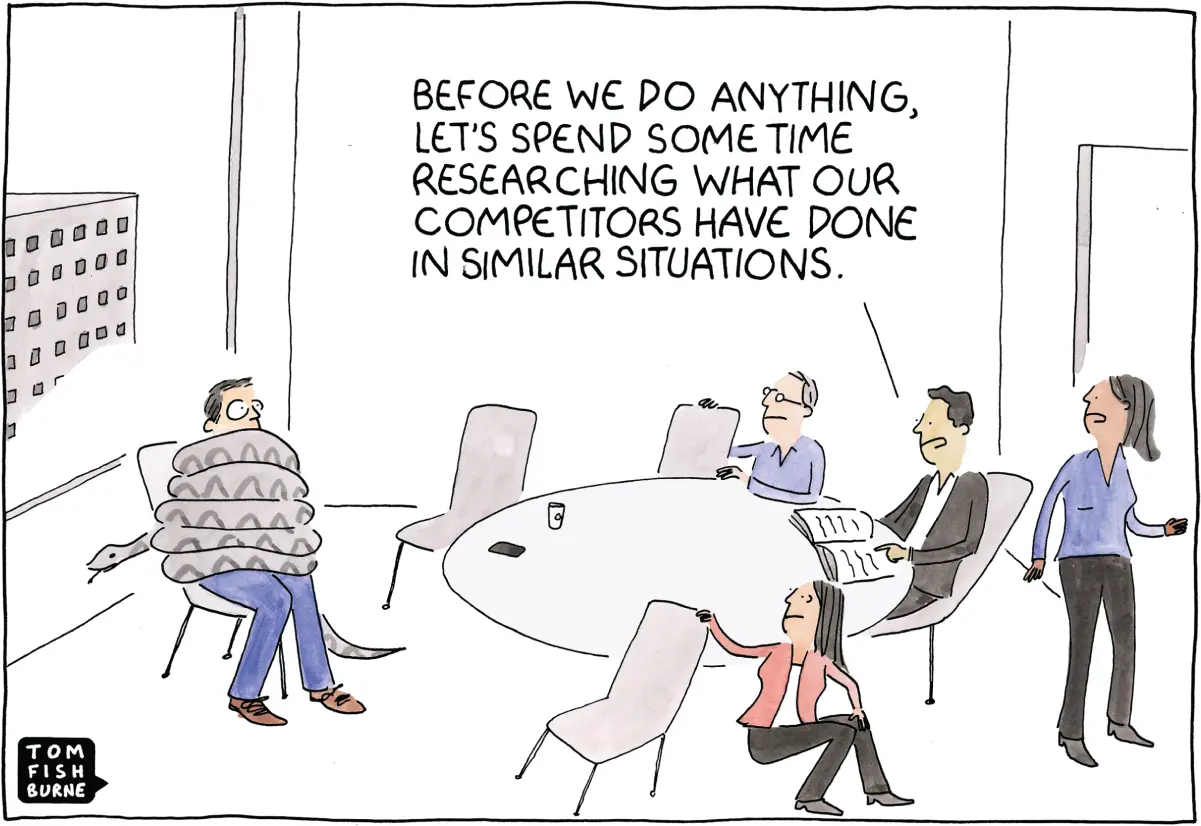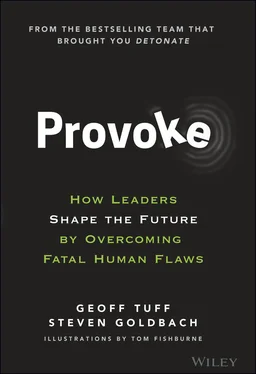The first step in adapting is seeing change in the external environment, and the second is choosing to respond. If you can't even see the changes coming, you can't get to a point where you can effectively debate how you'll respond and, even at that point, other biases prevent action. Companies must be aware of the human biases that create the precondition for systematic organizational blindness and inaction. Let's explore several of the cognitive biases, starting with those that make it hard to see trends.
Availability bias . If we had a nickel for every time someone, when challenging market research, cited preference of a family member to discredit or support the research, we'd have a lot of nickels. You've probably been in a meeting like this, too, where someone would say something like, “I gave a sample to my daughter and she hated it.” Although it's unfortunate that his daughter disliked the product, it certainly does not imply that the research is faulty. It's also clear that, in addition to not appreciating the relevance of sampling size, the person in question might be suffering from the availability bias – that is, the tendency to rely on examples that are easy to access mentally. It was challenging for our friend in Chapter 1to see the possibility of cord cutting because the concept simply wasn't mentally accessible to him at that point.
We would be remiss if we didn't note that the availability bias is certainly contributing to the current divided state of American politics. Social media has become an echo chamber and we are no longer exposed to other ideas or concepts and, as a result, find other points of view “wacky” or disproportionately “out of step.” It's too easy not to stretch to find new information or to try to adopt a different point of view when information that supports your preconceptions is so readily available.
Egocentric bias . Whereas the availability bias is about what information is more proximate to an individual, the egocentric bias is the tendency to overweight data that is consistent with one's previous point of view. Why is this important? The world is a muddy place and there is often lots of data that is unclear. If you are more likely to select and use data that conforms to your view of the world, then it makes it harder for you to incorporate different views into your overall perspective. Interestingly, there is data that shows that people who are bilingual are less subject to egocentric bias because they have grown up paying attention to others' points of view. When there are new trends that don't conform to your worldview, it's harder to see them – and even harder to incorporate them into your decision-making about how to respond. (The egocentric bias also tends to result in people overestimating their contributions to a group and underweighting the contributions of others, but, from the point of view of what causes people to miss trends, we are less interested in that aspect of the bias. 1)
The egocentric bias may have developed because the human brain is better at coding things into memory when individuals believe that information will have an impact on them. At some point in our evolutionary history, this may have had advantages to our survival. Now, it challenges our ability to succeed if humans are less able to incorporate data that is not obviously connected to our current worldview.
Affect heuristic bias . This bias suggests that people base their judgments on their perceived affect toward what they are judging. Here, affect refers to the size of the emotional response (either good or bad) associated with the stimulus. Essentially, affect heuristic is a “gut” response to something that is triggered when we have strong feelings associated with the subject. 2
The reason affect heuristic is partially responsible for the systematic blindness of people toward new – or distant – trends is that small trends are unlikely to provoke any emotional response. In our example in Chapter 1, our executive was unconcerned about a 1.75% segment because it didn't trigger any emotional response because it was overwhelmingly small compared to his overall market share. We also see this in people who try to get healthy. For many, the immediate response to exercising is that it “hurts” (a strong negative emotion) but the potential health benefits (a strong positive emotion) don't happen for a long time.
Each of the preceding three biases contributes in part to the inability of individuals to see trends that are at the “if” stage, or even the early “when” stage. They may not be in the available array of data that leaders assess, or they are discounted because they don't conform to their views, or they don't elicit an emotional response because of how distant they are. Taken together, “if” issues tend not to get raised within an organization until they might trigger some emotional response in someone (usually labeled an alarmist within the organization). Although we can't say this definitively, our strong hypothesis is that by the time something is triggering an emotional reaction, it's highly likely that the trend is at the far end of the “when” stage, when options for influence are limited.
The challenge of not seeing trends is further exacerbated by the human tendencies that prevent action against those trends. Several well-known biases include:
Status quo bias . This is a pretty straightforward bias: a preference for the status quo over a change. One explanation for this bias is that a deviation from the status quo is perceived by people as “losing” something – and humans are quite loss averse. Another explanation is that the status quo requires less cognitive effort to comprehend and maintain, while thinking about change requires more effort. 3
The status quo bias is key when applied to organizational challenges. In our experience, we see a pervasive behavior from management teams that is rooted in the status quo. Imagine a management team meeting to evaluate a new product for launch. They will rightly name all the risks associated with the move against the potential upside. In most cases, they implicitly compare it to a baseline characterized by the status quo. For instance, consider the following typical risks that one might hear in a management meeting:
“It may not work as we anticipate, and our competition will gain share.”
“Our customers may not give us brand permission.”
“Our channels won't want to stock it.”
“There's no way sales will go for it.”
“The lawyers will just say ‘no.’”
Of course, all of those are distinct possibilities, but the comparison is implicitly to a status quo that is riskless. Management teams almost never take the status quo and assess all the risks associated with not launching the product – risks such as maybe our competitors will launch something faster or if we don't launch it and our competitors do, we will lose customers in the future . The way human beings tend to think about the status quo naturally positions any deviation from it as a “loss.” In other words, it makes the status quo a “stock” value (measured at one point in time – the present), rather than a “flow” value (measured over time).

Overconfidence bias . Another bias that makes action difficult is being overconfident in one's likelihood of being correct. People overestimate the likelihood that they are correctly judging a situation. They underestimate the chance that they are wrong. Several studies have demonstrated this bias by asking people to answer questions such as how to spell words or true/false statements on general knowledge topics, and then assessing their confidence in their answers. Systematically, people overestimate their chance of being correct. In other words, on questions they say they are 100% certain they are right, they are only correct say 90% of the time, and on questions they feel they are 80% right, they are correct less than 80% of the time. 4
Читать дальше













